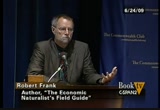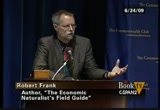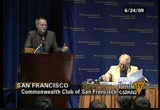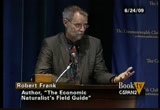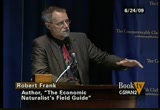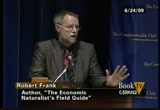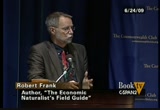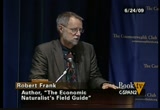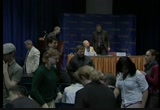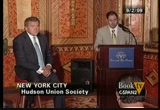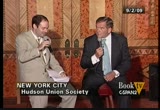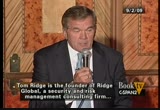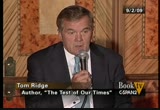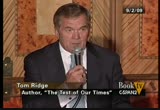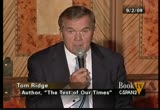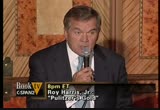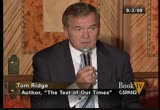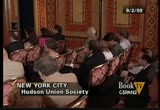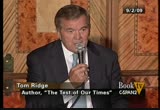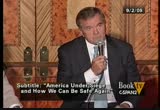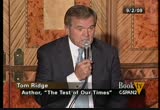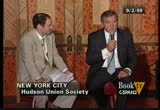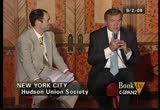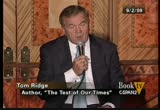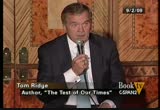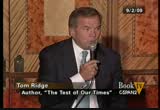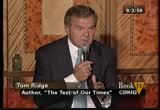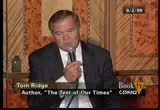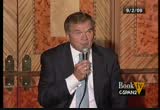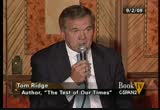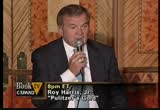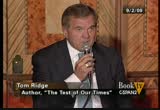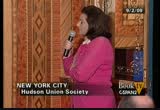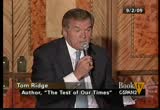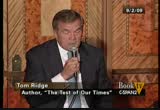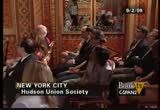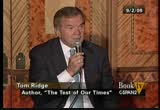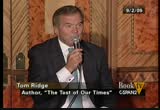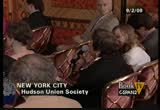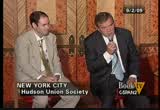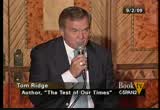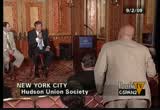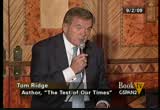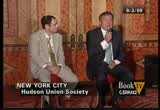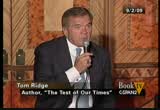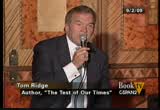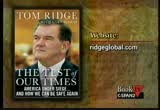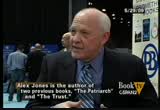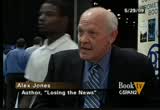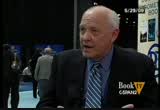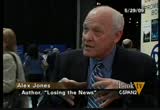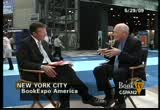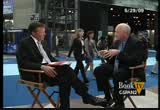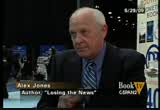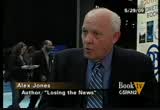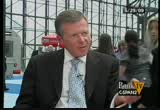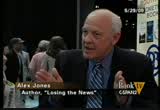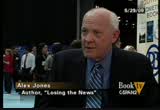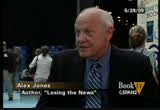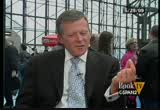tv Book TV CSPAN September 6, 2009 6:00pm-7:00pm EDT
6:00 pm
i think he was much more than a sociologist. he could couch his arguments differently. i think it's odd and unftunate that the commit -- committee never awarded the prize. >> it's hard to have a question. president ama seems to follow the economic theory fairly closely. has the president lt in your opinion faith in the power of free markets? :
6:01 pm
so think i am very comforted when i hear him spe about regulation and where we ought to be moving in that domain. >> utah quite a bit in your book about your criticism o the nobel prize, you made the followg ctatement. this was in a "new york times" article may of 2006. you said nobel prizes are sometimes awarded to scholars who are wrong for the right reasons but almost never to
6:02 pm
those who are right for the wrong reasons. i h all brief in mind in that column. i think as i mentioned galbraith had the right description of the fundamentaimbalance and spending patterns of the u.s. academy. his prescription for what to do made good sense. he didn't ve a clear vision of the incentive probl that generated that in balance and i think that is not surprising in light of his training. i think it's important in economics to have the righthat it than to come up with the right prescription. it is an aspect of the pression that hasn't served well in every instance. >> you were listening to the commwealth club of california radio program and the speaker today is a columnist and author robert frank discussing how we all can make the best economic choices in troubled times. professor frank, what are the biggest economic flacies tha you believe have led to this
6:03 pm
recession? >> i think that the deregulation of the financial industry that took place is in a single event that contribut mt to the downturn we are in the midst of if you allow financial institutions to create portfolios that are based mostly on borrowed money. so i put in 1 doll of mine, and by an set and borrow $50 to buy 50 times as mucas the acid a if the acid is growing and prices just a little bit i am going to get pretty rich in th process of doing that. that's aery risky but as long as the acid price goes up i see other people earng money focused people are on relave reports it is not realistic to imagine people will watch their neighbors investing in mortgage-backed securities, highly leveraged portfolios
6:04 pm
earning a bundle of money every year you've got your oinary safe investments, you are not earning so much it's hard to remain on the side lines uer the circumstances. warren buffett counseled against. he thoughthey were overprid. he didn't understand the business model. they were going up in price some people deserted and bought shares and cisco systems and levered up and collapse every time so the first step in the new regulation will be to somehow put a lit on the amount of leverage that financial institutions can engage in. >> while unfortunately we have reached the time in the program there is time for one last question. there have been several questions on health care and let me try to put them together if i can in 21. do you think a new health care reform package will adequately cover theninsured and the
6:05 pm
uninsurable meaning those with pre-existing conditions? will a new health plan include portability and is there a chan healthare reform in the obama administration will rece costs to the taxrs? >> the first problem you mentioned the fact there are people without iurance and it isn't portable, those problems stem from a single cause which as weely on private insurs to provideealth insurance. that is a failed business model effectively for this enterprise. the prhvate insurance companies imperative is to not sign up as clients people read medicare. they want to find all the people to ensure whoon't need medical ca so much of their budget is devoted to identify anwho is going to need care and thdn taking steps to exclude those people from the policy role. another part of the budget is bad on aggressive efforts t deny reimbursement claims so if
6:06 pm
you do have a policy and you do get a procedure and seek reimbursement they have experts who get bonuses if they deny claims and extra salary of dating my a proportion of claims. that is a field business model for providing health care. that is called the adverse selection problem and why no othemajor economy provides health care along the lines of th model. every other country has a universal access system that is ughly speaking a single per system. i think the obama adminiration's proposal will include a vigors public plan. if it doesn'there will be a lot of the uproar i am sure if a bill comes out without that and then there will be the chance for the public to choose. it will be a public plan that will take all comers and you can carry with youherever you go. it will a public plan that will not charge you a heavy premium if you have previous
6:07 pm
conditions. and so if people hav access to that plan for reasons of their own they choose not to buy it, good but as long as that is part i think the health care reform effort can be said to have done its job. can it could cost? i thk it can. we provideare and the least efficient way of anyodern industrial country on ara countries spend half as much per capita as we do. people complain there are waiting lines and that is true some there are but we uld spend than three-quarters as much if we did more efficiently and havno waiting list how we want to spend the money. bigot have a mor elaborate plan with short waiting lines or a cheaper plan with longer waiting lines. we have leading to the competing lines now that are denied care for ever that's a waiting line. >> thanks to robert frank professor of onomics at cornell university, "new york
6:08 pm
times" columnist and autof the new book, "the economic naturalist's field guide common sense principles for trbled times." we also thank the audience here and on radio, television and the internet. im joe epstein and now this meetg of t commonwealth club of california celebrating more than a century of enlightened discussion is adjourned. [applause] frank will be outside to sign books. amol conversations he will be signing books right out here. >> thank you very much. >> robert frank is the henry eda johnsonville is ofessor of management at rnell university's johnson school of management. he's an economic columnist for "new york times" and author of six books including principles of economics written with federal reserve chairman bernanke. to find out mobe, tisit roberthfrank.com.
6:09 pm
tom ridge first secretary of homeland security discusses how he got the job and the politics involved in the creation and daily operationof homeland security. the hudson uon society of new york post's this event. it is about 40 minutes. >> following the tragic events of september 11, 2001, tom ridge became the first secretary of the u.s. department of homeland security. the eation in the country's 15th cabinet department marked the rgest reorganization of the gun man sin the truman administration, another call to service for the former soldier, congressman and governor of pennsylvania. before the events of september 11, tom ridge was twice elected governor of pennsylvania. served as the state's 43rd governor from 1995 t 2001. governor ridge was raised in veterans public housing and erie
6:10 pm
pennsylvania. he earned a scholarship to harvard and graduated with honors in967. he was one of the first vietnam combat veterans elected to the u.s. house of representatives and was overwhelmingly reelected by pennsylvania voters five times. these and gentlemen please join me and warmly welcoming governor tom ridge. pplause] >> so governor ridge, your book has ten the media and the press and the public by storm. one of the main things in the book people have beenocusin the gun and i know you've been asked this many times before in the last couple of days you state in the book you were pressured by dom rumsfeld to raise a terror alert level. cod you state what actually
6:11 pm
happened? >>hank you, joe. i nt to be very clear. other pple say that that i was pressured. but in careful reading of the book, would hope you would conclude that admittedly there is a passage that if you have an imagination yo may conclude that is what it says. it really just calls in my mind a bigger issue i dealt with as the secretary and, look, i am not going to second-guess the people that interpret that way, they are in title the inrpretation. onof the challenge we had when i was the secretary is keeping the plic informed and keeping the security people with whom we dealt at federal state and local and within the private sector informed of the need to add additional measures of security. i can recall gng out on seral occasions with attorney general ashcrt, director
6:12 pm
miller and we would go out before we had the threat warning syem and say to america we believe the threat to mauro is greater than the threat today of terrorist attacks, be alert. be award. the media would start scratching their head, the pubc would be wondering what are they talng about? what are we supposed to do? we would conclude the prs coerence. after one of the conferences i turned to a trusted aide and said we have to do something about this and as a result was the color coded homeland advisory threat system, threat advisory system. it should have been colors, numbers, alphabet? i don't know, abc, 123. blue, yellow, orange, red, that isn't as important as what those letters and alphabets or colors signaled. everyone was a signal that a prescribed level of security should be built, pre-described, prearranged. if we go up you nd to do these
6:13 pm
additional things so that was the edify system but before that was used, and this is where the confusion texas i said when i was the secretary and i said i on natinal broadcast i try to explain in the book nobody, not the president or the secretary of the department of homeland security can unilaterally raise the threat level. no one could be pressured to raise the teat level. the discussion goes like this. if you had a youtube video of some of these discussions you wod either see some of the president's homeland security cabinet around hi adviser either general john gordon that succeeded me or fred thompson that succeeded the general. and the secretaries estate defense e attorney general, the fbi director, cia and several others. we would discuss in the intelligence that merited the
6:14 pm
collective review to determine if there was consensus to raise a threat level. but the automatically raised it. nobody was ever threatened. i was never pressured to read did we disagree time to time? yes. to the weekend before theefer presidential election. a dramatic and it was the weekend before the presidential elecon not any different than multiple other occasions when all of those parties were called together to decide whether we need to raise the threat level and at prescribed levels of security in america. is was a bin laden tape. anything particularin laden could sending tapes over the time i was in washington and like america they don't care for the val system. a bin laden tape wasn'tews. was there more to it? this waslso in addition to the trauma associated with the weekend before a couple of months after a terrorist event
6:15 pm
in spain altered the outcome o that election. so a lot of things going on but no one at any time on this occasion or any other occasions which you don't know about because we didn't raise the threat level whene got this group together a consensus was there was not eugh to raise the threat level. nobody pressured anybody. that was the consensus. these were tough judgments, tough calls and after in writing my book, after it was all said and done, still wondeng why some people were arguing so -- they were not arguing that sort of insisted we go up. i use in the book is a politics of secury or something else going on? that is a far cry from suesting anybody was pressured or that politics was used throughout time ias the secretary toaise the threat leve in tha story. >> just braefly, how did you
6:16 pm
come to the conclusion -- why was your conclusion different four days before the election not to raise the threat level as opposed to john ashcroft and donald rumsfeld wanting to raise it? >> that's the beauty of the system. we all have our own intelligence chiefs. we all he our own intelligence networks and those who sit next to us and discuss with us the importance and rehevance and the need to use that to put america on the alert and differenc of opinion they call it inside the intelligence world competitive intelligefce. you might look at a different set of facts and come to different conclusions. i quit this is at an auto accident and supreme court opinions rarely i regret there are some people that suggest i was second-guessing my colleagues. i do not regret using at the end of my book after what i consider
6:17 pm
to be a dramatic moment wondering why some people wanted to go up but the moment in and of itself in relation to madrid and everything else was their something else at play and i missing something because if i am missing something and something goes down, you kw was culpable? secretary of homeland security i he to make sure i understand all the facts. >> also mentioned inhe book you were never invited to a national security meeting and it was hard to meet with dolph rumsfeld. do you care to comment? >> again i do want people to read the book. i didn't wri that line with regard to not being invited into the national security council meeting th as a complaint or as a criticism. the during the past couple of years people said were you involved in planning for iraq or afghanistan and i said no, we were certainly invold once we knew we were going to war in iraq. i talk about something we built called liberty shield but i didn't feel like i was ostracizedr somebody trying to keep me away from something i should have the ir strictly the
6:18 pm
presidential call and frankly i think this to a certain extent president said tom has a lot going on. wher we made a decision that affected my department i knew immediately. knewbout it as soon as it was rendered and other peopl said we better get the department of homeland security involved in whatever tension they want less involved in, so it wasn't a complete. >> my relationship with donald rumsfeld we've got a good relationship, but he was planning on giving the reference in this book he's ready to go into afghanistan after 9/11. he has a few things on his mind, and the incident i refer to in this listened to the president and i know governors are going to have to go get the national guard and the years wilhave to put police on overtime and come back to me and say we need money to do that. ok i can get it, if i were governor i would havsaid the same thing. i got the secretary defense
6:19 pm
6:20 pm
ha a so i think i had a reputation being a soldier might have been part of it. being a governor i think helped. i think one of the missions and think the president probably felt this within the new department of homeland serity is a federal departmenbut a national mission. the deral government has to be working with state and locals and police chiefs and private-sector so having a governor who understood those relationships will also have
6:21 pm
federal experience but maybe when the president rights memoirs he will tell you. kae couric asked me that question one time,oo and i think i gave her the same answer. the a of youtube you could go back and see if i deviate from the text or not. >> could you describe the department of homeland security how many emoys, the size and scope? >> really big. the largest reorganization since the defense department as you pointed out. bits and pieces from over 20 different agencies preisting agencies, 170 to 180,000 people was weere creating a new bureaucracy. the intonation was we were going to hire another70 or 80,0 people. most the men andomen who came to serve within the department homelafsecurity had already been working for the federal vernment. they were just aligned in a way
6:22 pm
around a broad mission to secure the homeland, and frankly there is much discussion that ther was a llmor commission set up by congress former governor of virginia to take a look at the structure even before the 9/11 hard red m in the 90's suggested some kind of agency but that discussiohad been goinon 50 years. you think about it as the world grows smaller and we are more interconnected a interdependent shouldn't the government have an agency that is border centric that monito the good f of people band forth and sets policy that deals with that whether it is immigratn policy, paul pport, border policy so it made good sense and finally the president decided we are going to do it and instead of waiting for the congress to come up with an architecture structure the president commissioned for the best and brightest people to an
6:23 pm
intense six weeks to get the job done and ultimately the structure became the departme of homeland security. one of the interting things about that i mentied in the book this was all coing on in washington and nobody knew about it. that is rare. >> what improvements do you recommend for the department of homeland securit to make the nation safe? >> i will give you tell all list ofecommendations or thoughts i have and the way ahead, but let me share with you a couple. and i've already talked t secretary napolitano. i called her the day before it was announced that she was going to be the secretarof homeland curity and i told her there were only two people in washington that knew how tough and challenging the job would be and that was michael chertoff and tom ridge so she had to feel free to call on us and has actually i give her credit for that so she has her own agenda but i must tell i've mentioned
6:24 pm
to her on a left on the shelf a regial structure i talk about in the book where you drive some of the relationships a drive the oversight and a lot of the things we try to do from washington down to the regnal level and you bring in all of these disparate agencies, the big groups, fema, coast guard, etc., makehe offices in one place and we had eight regional offices incidently one of them would have been new orleans so i asked her to take it of regional structure in the book and suggest that. excuse me. you say that -- drinks after this is all over? okay. i need a champion of the coast geard. i think the united stes coast guard is the most undervalued underfunded ltitask organization in the federal government and i strongly urge this congress, somebody in the secretary to janet. they get a lot of lip service
6:25 pm
after the do hartwick things but they don't get enough money and i recommend that. i talk about better use of biometrics inmerica. actually i say in my book i think we ought to have a purposeful debate and discussion as to whether or n we want a national id card to cbat terrorism, combat crime, combat identity, theft against fraud against the government. in a world that is interconnected, think to yourself what other relationships you have where your identity is notmportant. online purchase, going through a screening. there is a long list and yet we also know and i saw this as the homeland security secretary i have seen some forged documents you would nd the most experienced professional with a very good microscope to look at
6:26 pm
individual passports to determine if they were real or fraudulent. you balance security with privacy. i know there's a lot of resiance in the national id cards some people are just kneeerk opposed to it. let's sit down and see if we can make it work because biometrics can protect your privacy but i think that we ought to have that discussion. i talk about that. we ought to fenech u.s. visit. the law that decree did the department of homeland securi said you need to create an entry exit system. again something they've been talking about for a long time and really important in a border centric agenc we have pple coming across but this is about people as of december 31st we had to have an entry system and airports and we decided we were going to take a digital photo, that in the databa, get a little information by the waye are going tget a couple of dits.
6:27 pm
digil fingerprints so we know that you are here. we know that you are who y say you are a we got your fingerprints and we know your name and we know based on your passport or visa how long you are allowed to stay. well, then we want to monitor when you leave. we don't have that system in place yet so we have a lot of information about people who shed up. we are still kind of short on whether or not they left. so in that sense there is a sense of urgency tt somehow after 9/11 we ha kind ofost. so that and quite a few other things i make a recommendation. i wont give in to the greater detail, maybe if you want in q&a. >> during e most recent presidential campaign press mentioned you as a front runner for the nominee for senator mccain. what you think senator mccain pact sarah palin? >> you will have to ask john. [laughter] weame in second you probably noticed. i was senator john mccain has
6:28 pm
been one of my good friends and best buddies since i commended the political world in 1982. we were the vietnam verans and eckert he stated the imam longer than i did under far worse conditions so we have been friends long time. i was proud tbe the national co-chair. he made the choice and i still think that people focus o what he did or didn't do but there are two things i don't think in the discussion have been left out. one is that now president obama and the most technologically sophisticated campaign in history of politics. these folks know how tose the internet. these folks are good and they know how to proselytize, retorted, fund-raising and we were not close and the other thing i say this is not a criticism but nobody mentions it but he blew the walls out public financing. at one point in time he said i
6:29 pm
am going to take public money and at thend of the campaign it was three-quarters of a billion dollars so when you have technologically sophisticated campaign, we are not winning it's just the way it worked maybe two or three times as much as your opponent you have a good shot of winning and the environment was tough. weaver and i think an admirable campaign, and honest campaign, and i am sure he joins me. we want the president be successful against these terrorists and when we think he is right we will be supporting him and what we like the kind things he sought from his attorney general talking about in the past couple of days will rise up and objec to that as well. >> what do you think about arlen specter and old friend of the u.s. switching parties and what do you think of the present senate race in pennsylvania? >> welcome arlen specter is the old friend of mine and i am not referring to his age. we've been in the republican party long, long time. and if he asked me and said went
6:30 pm
to the alamo once and the reason why bank is because it represented a place people fought and represented what they believed and i would prefer he take his stand sometimes which are controversial within the party and fight within the party. he made the choice and i think that he has a very difficult challenge with congressman sestak but he is one relentless on tyring campaigner. fasten your seat belt, folks, it is a to be a very interesting primary but the fact there is going to be an interesting primary i think every day proves the chances for the republican nominee who appears to be the congressman three terms of excellent chance to become a very competitive race. >> and the million-dollar queson today -- >> how much? >> million-dollar question, are you going to be running for president in 2012?
6:31 pm
>> it's not worth answering. [laughter] >> thank you very much. i've run 80 elections like rocky marciano, i am not sure i am as good but i am undefeated d i will keep it that way i learned never say never. when started in politics i didn'think i would be governor and never thought i would be cabinet secretary but i think it's on likely what i do and will commit to as long as i am able is to make sure over the next seval years our numbers increase at the house and senate. we have a couple of races this year to do a little work in virginia and fund raising th the end of october and look towards building towards victory in 2012. it is unlikely you will see me on the ticket but it's likely at you will see me involved. >> on that note i want to take a couple of questions. ca we start, and please --
6:32 pm
[inaudible] >> mr. secretary, was on the national security council of 1975 and '76 when we had cia trials very similar times and today as a result of that we are eliminated han intelligence gathering throughout the world and i personally think that is what led to the fall of the shah of iran and we didn't know, we never saw it coming and we never saw al qaeda. we never saw islamicihad as a movement because we didt have spies. i know you've spoken a number of times on the last couple of days what to think is going on and what do you think this means for american national security going forward if we gohe same road we did in 1975 and 76? >> i've asked people think that it's politically motivated and since i am trying to run against the second-guessing anybody's motives and i don't want to do that but i am the wrong thing to do just from the get go.
6:33 pm
let me give you an example. i thought about this the other day. one of the strengths of the patriot act that were important ancritical provisions it tore down wall, the legal barrier between law enforcement and intelligence. we couldn't talk to each oth. patriot act against the wall. very important. this is almost like putting of a psychological barrier. you will need a legal wall because there won't be any information to share. if you are going to say somof these techniques are barred, which would be perhaps the unintended, certainly nsequence going after people who use tm inhe past few dot professionally barhan you will not have intgence share. sleep deprivation soting a firearm in an adjacent room some of these things i am listening to i am on record, folks waterboarding i disagree with vice president it's torture i
6:34 pm
have seen don't bother me a bit. what bothers me even more however is the fact after my knowdge and we had cia interrogators instructed to do what they did to get as much and credible information as quickly as they could t make sure another incident occurred -- did not occur. they were told they were authorized to use these measures and go back five, six years later second-guessing solving them to prosecution it's bad policy and it's almost unconscionable. for them to do that, and the affect, i don't know if anybody wants to interrogate anybody and the slightly aggressive for fear somebody will send-guess the technique, period. it's n simply putting these folks up in hotels getting three squares a day saying when you fe like talking give us a call. there are certain restrictions and we have imposed them and that is important.
6:35 pm
barring waterboarding is one of them going after people who interrogated is wrongheaded. >> growing up in pittsburgh -- they're growing up in pittsburgh john hines is my congressman. i think that john hines untimely death changed the history of the united states because i am fairly sure he would have been the president. my question is where are republicans like he and you better centrist republicans like myself can vote for today? >> first of all john hines came in and campaigned for me in 1982. there's only been toolitical figures in my lifetime in politics that i thought had coattails' wrehere embrace mant votes. one was john heinz and the other was ronald reagan so i looked back in the first race and they won and that is when the democrats were trying to scare everybody about social security and john heinz came in and publicly embraced mend said
6:36 pm
tom ridges a good guy i trust him in spite of the democrats say were not taking social security away and it was worth at least 729 votes, so i was grateful to john. i think one of t challenges of our party, and this is obviously some people may differ is to understand philosophically that disagreement within a grp doesn't mean the group isn't unied. the disagreement doesn'tean mr. minetti and the unity doesn't require unanimity of thought. and i think that we should understand that there are basic principles which all of us subscribe, and those you might us, but eve among those there may be a difference or two. it is pretty ear where i am on the question of choice. and it's pretty clear that the republican party will always be
6:37 pm
the party that has a point of view contrary to mine. i accept that. but i want them to accepty view as well. two republican presidents altered my life significaly. richard nixon sent me a draft noticed and that being an infantry soldier in vtnam. my frienof 20 plus years george bush called me and we talked about the experience and said leave the job you love and come help me combat these ideologues'. neither one ask me where i stood on a bunch of issues. they just said will you serve and it's that kind of mentality we nd to bring back to the republican party. understanding where we are in me of these issues unless we are more willing to accept that kind of thought andot disqualify a candidate because they are n in lockstep. ronald reagan said it best if you agree about 80% of the time
6:38 pm
you are a darn good republican. we have to practice what he was willing to preach and lived by by the way. the of the thing i spent a lot my time supportingandidates on some of these issues i disagreed with. i didn't keep my support from them. it just means we disagreed. not that these were servants willing of being elected. we have to get back to the mind t. >> my name is alves, former u.s. department of state for in service in omaha and -- and u.s. embassy, u.s. missi under richard holooke. my question has to do -- i have been getting beat up around town because i kept asking for a military presence on governors island -- >> [inaudible] >> i am getting beat up all over
6:39 pm
town because i keep proposing we have a military presence on governors island. i feel like we are sitting ducks out ere in dahuk harbor so i would like your comments and encourage you to run for president. >> [inaudie] [laughter] >> military presence on governors island, i don't know enough about the security requirements out there to comment and i can understand why people don't want to have the military run and around there. presumably you want them there for ecurity purposes i remember under president bush's secretary of interior and others we looked at the security people access to it obviously there have been anges made, and everybody is conscious of our security around certain monuments and then using the states. i would be comforted by the fact that assessment goes on on a
6:40 pm
day-to-day basis and if they thought there was a need for but for the time i wouldn't worry about too much security. many tim after 9/11, not right after the fight for six months afterwards parents of young people who were friends of mine would call and say the kids have a trip to new yo city. should they go? the kids have a trip to washington dc. should they go? and every time i said yes, absolutely. we are a lot smarter. professionals haven't lost the sense of urgency and the one thing we could never do and one of the reasons i wrote the book is to convince you the threat is real everyday we are prered to deal with it and better prepared ofnoth attack we shouldn't quit in joining the opportunities we have which are rather unique in the united states of america
6:41 pm
sir? >> [inaudible] mr. secretary we know that there is -- we know there are terrorists around the world. after mumbai and other attacks that have taken place using social networks, atwitter as well as cell phones. how prepared is the country to deal with the upcoming technology and monitoring it to protect our meland and allies around the world? >> well, i believe that since 9/11, we have learned and some of our allies have learned not only how effective terrorists are in using it to recruit, train, etc., but we have found
6:42 pm
our way, the ubiquity of the internet, it's also its weakness and i don't pretend to say that we have --hat our security personnel have it covered but every single day and it ione of the initiives i think of this ainistration is cybersecurity but in addition to securing cyber cites the put is an emphasis and i think they will on supporting the dod and the fbi what resources they need, the personnel and the technology to try to penetrate that cyber recruiting system they have. as you know it is pretty tough and it's very difficult. the fire walls and everythg else but i know that we do some interestg things, our allies do interesting things so it isn't as if the messages are going undetected and on noticed because they are not. >> chris? >> [inaudible]
6:43 pm
secretary bridge, how would you rate the performance of the obama administration in the first year and under what circumstances do you feel you would be vulnerable in 2012? >> vulnerable to what? >> to the republican candidate. >> this would be a good political question. well, first of all, my first impression is too much and too fast. i certainly appreciate the fact that he offered to change. i'm not sure and it's clear right now a lot of americans are saying i'm not sure this is the change i bought into when you got my vote. i don't think that i have voted for 9 trillion-dollar deficits. i don't think i voted for a cap and trade bill because you promised me you we not going to tax me and i don't think
6:44 pm
right now a lot of this concern about the delivery of health care although some people thin it's organized i think it is legit. 70 to 80% of americans might have conces about health care delivery system and the notion that you're going to rn it upside down in order to resolve some legitimate issues that people are turned o by all of that so i guess my first assessment becse i think as a three breitman obviously he has got great rhetorical skills what is the rus healthcare is a great example. health care in place about 13 or 14 million peoplin america. about $2.5 trillion in the economy and i don't know of to any health care prossionals on the hill let alone the adminiration and to think in the 30 or 60 or 90 period you can go 3,000 page bill that would dramatically i think affect those employees that in the health care system i think is moving too fast.
6:45 pm
i keep thinking as a former governor if you have different ideas why don't we try a state or to and see if they work and there's other ways to deal with the other problems so performance obviously the popurity has dropped considerably the past couple of weeks. that can rebound easily. my personal wish is he would slow down, reached across the aisle. i don't just know how -- never sincerity i don't g the sense from my friends on the health there's been a legitimate effort on these to find comm ground. listen, i once sold the online title wind nels would be fine, we've got them in pennsylvania, weedy regulated. i know some people pay more for grain energy but if we truly want to be energy indendent i don't know how you could avoid nuclear, gas. and i would encourage him to think about a comprehensive energy strategy rather than just
6:46 pm
renewables. i think that is very important. >> ladies and gentlemen on that note general ridge has agreed to sign books and meet members in the back. if we could think governor ridge for taking the time. [applause] >> tom ridge is former governor of pennsylvania and first secrety of homeland security. he's founder of rage global security risk management consulting firm and he co-chairs the flight 93 memorial. to fin out more, visit ridgeglobal.com. alex jones osing the news you refer to the first and that this fragile. why? >> guest: the first amendment is a great bull work in this country and it has been but it's only been tt great bull worked since the 1930's. most of our history that a great
6:47 pm
bullwort that we think that this absolute have beeon certain because in times of great national stress they get impinge upon and our supreme court determines what the first amendment free lee says. before world war ior instance in fact during wod war i he was against law to express any opposition to the war. that isn't the way people now think abou whathe first amendment guarantees. at wasn't long agand i think it is fairo say the first ament whil adis secure in one see as a hostage to what might happen in this country the event of terrorist attack when people get scared they get very scared and the first tng they get rid of is their right to have a kind of open discussion on free-speech. theoretically guarantees. that is something that can be
6:48 pm
very much a matter of what the supreme court says is and also a tter of how terrifd people are. whenhey are terrified everythi can go outhe window. >> host: what changed in the 1930's? >> it was a case called meter versus minnesota. he was a bigot, anti-semite, very unpleasant whoad a newspaper in minneapolis. and he was willing to sort of put himself into this position of calling people terrible names at the same time though he was exposing corruption. he was sued by the state of minnesota under ate law that said essentially he couldn't call people names and be disagreeable if the people in the authority and state government didn't want this. it took the supreme court at the moment to say that our constitution orrode those kind of state walls which were everywhere.
6:49 pm
for instance before the civil war ifou lived in the southern part of this countryhere i come from a few expressed opposition to svery that was against the law. that is in the way most people think of the amendment. they think it happened in 1791 part of the bill of rights, the guarantees were there fr the beginning. not so. >> iin that vote representative of what is happening today in the blogosphere? people can have their opinions and whad ever they consider to be fact posted online for the world to s? >> absolutely under the situation we are now. people in this country no matter what their political persuasion recognize the importance of the first amendment guarantees. what i argue in my book is that those guarantees and especially the nuances of those guarantees depend on what the supreme court sa, that they say they were and for many decades of histo, for the two-thirds of the
6:50 pm
history as a nation the supreme court didn't say they were what we assume them to be. >> why, alex jones, do you include with chapters on gay righ and civil rights in your book losing the news? >> what i am trying to do in the book is makelear to people that what is happening to what i call the iron core of newshat is based on a reported facts, not opinion but reported facts is in jeopardy because the digil revolution. it's in jeopardy because of the economy. it is jpardy because of what is happening in the newspaper industry because newspapers that provided i would say 80, 85% of that hard core ws, and if that goes away which it increasingly seems to be what is going to be lost with that is a lot of other things like the traditions in this country of objective journalism ane journalism ethics that
6:51 pm
are the essentials basis of the kind ofournalism that kind of journalism is based un and then holds aountable so it ist just a matter of a newspaper losing a few reporter what we are facing is something we need to address which is why i wrote the book is mething that can affect the whole profession of journalism as we have come to understand. the web is a wonderful thing, the digital fure, something that is unavoidable a welcome and i welcome it but it is something that we need to be solutely certain isn't going to come at the cost of values most americans i think really believe in and certainly most journalists like i believe in. >> you talk about citen journalists. are you a supporter of citizen journalists? >> iowa supporter of citizen journalism but i don't think thatitizen journalism is the antidote to what i see as the erosion of serious professional journalism.
6:52 pm
i thinkitizen journalism when i started as a reporter and this is probably true for most i used to go to school board meetings and there were always people there that were very interesting. they were very interested but also had a strong point of view in many cases. they are typical but citizen journalism often is, people who are deeply ierested but i don't think that you want to be dependent on their vision and their version of events. that is why i think that professional journalism is important no matter your politics, that the basis of verifiableact and journalists can be held accountable. that is what i believe is essential to our sort of state of deiocracy in the country. >> the editor of the journal wall street to the eckert robert thompson referred to the google and dahuk as tapeworms. >> i couldn't understand what you said. >> robert thompson editor centlyeferred to the google's and yahoo! is of the
6:53 pm
world of the news world has tapeworms. do you agree with that? absolutely. >> why? >> google especially google news is a wonderful way to get any information on any subject. to go to ggle news collotype the topic and up, 200 or 300 articles. those articles are for the most part articles published in newspapers. the person who goes to those articles is a customer of cool effectively. ey are not a customer of the newspaper that paid the reporters salary that put that up and i think until reporters and journalists and news ornizations find a way to make google pay for takin their work and labour and selling ads on google against it google is making lots of money in fact google makes most the money that is made from advertising on the web as the bi google eight next to them, yahoo! t they don't hire reporters or pay journalists and they have no
6:54 pm
hand in creating that news. they feed off of it like a people were feeding off of somebody's gts as they are sortf actinghey are along for the ride. that is a very d model forhe future because it kills the goose that laid the golden eggs. of those organizations stopped repeating that news google news isn't ing to have much to aggregate. >> so what is t solution to a whole generation growing up what they consider to be free news? >> that is the great rebel are we going to nd a way for existing news organizations to survive with a commeial model that i based on the web and on print on justhe web alone i don't think we have figured that out yet but i catel you this if we don't find some commercial mechanism as far as i am concerned to sustain this kind of iron core news by serious
6:55 pm
journalists, and i'm not talking about gossip and features. i'm talking about stuff that is the essential information we have o national conversation around. ifhat news doesn't continue to be reported a local level and regional level i think we will have a serious problem with the democracy. that is an economic ripple that is yet to be solved. i certainly hope it will be solved and there is a reasonable chance that it will. >> you, in your book, "losing the news," give three examples of solving that problem and if you could explain them a little bit more. the poynter institute, the in dustin alabama newspaper and the news hour work propod plea you put forward the news hour with jim lehrer. >> thesa and of the nonprofit world. i welcome the on profit solutions. i don't think that they are nessarily ones that are going to be the most sustaining but i
6:56 pm
welcome them. but i sugges abo the news hour work if you happen to be a billionaire out there and you have some money you want to use to change the world, the way you can change the world most quickly and most powerfully in my opinion is to endow the news hour and make the news hour instead of a talking head program did g the money it needs to become a genuinely high-quality television news gathering operations with the standards the news hour has under jim lehrer. the news hour has one hour of prime news time every television set in america. pds basically has that program on every tv set whether they are on cable, broadcast read if you take the quality of the news hour rresents and what it does and add to that of the muscle of the ne gathering enterprise in geneva in terms you would transform television news and by doing that would transform whole
6:57 pm
news environment because you create a genuineival to cnn, fox news and msnbc that was focused on high-quality television news. high-quali television news is the most compelling is probably that there is but it's expensive and it takes a lot of talent and a lot of people would love to do it if they coue able to feed their families and get it on the air. if somebody wants to endow the news hour to that and it would t on the air and it would have a profound affect in my opinion. as far as these other models that you're talking about, they are models in which individuals either give their organation to a foundation or create a foundation around their organization. i think those are things in the work that will be happening in some places and i think they are going to be -- i don't know. i hope they are going to work but that isn't the solution that is the long term one in my
6:58 pm
opinn. the solution that is long term ll have to be commercial. one that allows news organizations to make a prot and therefore be able to pay the journalists that d the work and let them send their kids to school and pay a mortgage. >> you are a former "new york times" reporter. what are you doing now? >> i'm the director of the shorenein center policy at harvard university and also from a family newspaper b out. i am in the fourth generation of a family that'swned small newspapers and east tennessee and we are still at it. my father's 94-years-old, he's the publisher. i have two brothers a a brother-in-law that work there every day. weant the newspaper business to survive and i believe that all lot of people when they think about it carefully they realize this is important to our country and our national discourse. i think that we are in a dangers place right now and i am hoping "losing the news," the
6:59 pm
book i've written, will make people not only aware of things and play the deep cuts for obvious also examine the issues that are going to be in danger if this all goes ay like objective news, like ethics in journalism as know them, like the kind of protections the first amendment is bstered by, whh are i think greatly furthered by a robust serio news industry in the country. >> you mentioned your father. you quote your father in here sang you cannot run a newspaper and have friends at the same time. >> my father is a very wise man. as i say he's 94 and one of the things he said to me when i was a young man he was the publisher at our newspaper i our town. i think it was a very community might newspaper but it was also a newspaper under my father's
230 Views
IN COLLECTIONS
CSPAN2 Television Archive
Television Archive  Television Archive News Search Service
Television Archive News Search Service 
Uploaded by TV Archive on

 Live Music Archive
Live Music Archive Librivox Free Audio
Librivox Free Audio Metropolitan Museum
Metropolitan Museum Cleveland Museum of Art
Cleveland Museum of Art Internet Arcade
Internet Arcade Console Living Room
Console Living Room Books to Borrow
Books to Borrow Open Library
Open Library TV News
TV News Understanding 9/11
Understanding 9/11